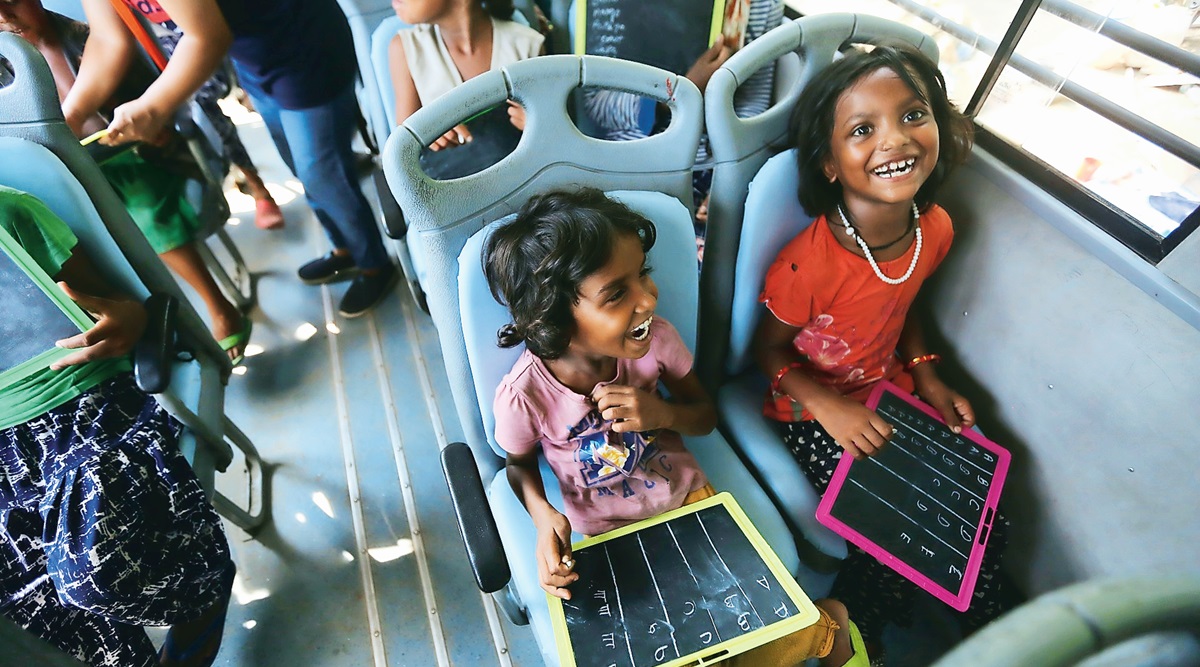 The number of students on ‘Hope Bus’ has doubled since the lockdown in 2020. (Photo: Tashi Tobgyal)
The number of students on ‘Hope Bus’ has doubled since the lockdown in 2020. (Photo: Tashi Tobgyal) Eleven-year-old Sapna’s dream is to become a police officer, but she worries she has forgotten everything she learnt in her school before the lockdown was announced in March last year.
For the last six weekdays, though, Sapna has been attending classes at a ‘mobile school’ — a bus with teachers, blackboards, pens and notebooks.
The school, also known as the ‘Hope Bus’, has been around for 10 years, but operations have picked up since the pandemic struck. “The number of students who attend classes in Tughlaqabad doubled after the lockdown in 2020,” said Marlo Philip, founder and executive director of TejasAsia, the NGO running the mobile schools. Four such buses travel to nine different areas every day.
When their education project was put on hold during the lockdowns, they continued to provide meals to the poor. But ever since DTC buses were allowed to operate at full capacity two weeks ago, classes have resumed.
On Monday afternoon, Sapna and her friend Preeti left their settlement and took the meandering stairs behind the Tughlaqabad fort, as old as the fort itself, to reach the mobile school.
Around 50 students, aged 6-13, took their seats on the bus. While some had to be called from their homes and prodded by volunteers, others turned up enthusiastically on their own. Some put on pause their work as ragpickers so they could study instead.
The next two hours were spent learning the names of body parts, which they repeated in English and Hindi after their teacher.
“I have forgotten the names of fruits and colours. I am trying to relearn all of them now,” said Sapna. For months after the first lockdown, Sapna’s family went back to their village in Bihar. After returning, she said she wanted to study but five siblings had to share a phone and she hardly ever got a hold of it.
Preeti’s parents give her their phone at the end of the day, but she plays games on it instead of studying. When Sapna teased her for it, she said, “I work all day… so I do not feel like studying at night. I prefer to play games instead.”
Their parents work as waste pickers behind the fort. Both girls said that when school was on, they could avoid household chores since they were away from 7 am to 1 pm. In the last year, Preeti has had to make rotis for lunch every afternoon, and then help her parents sift through waste so they can sell recyclable material.
These two hours give them not just an opportunity to learn but also precious time away from work. After learning names of body parts, the children are given individual slates and chalks, on which they spell them out. Once classes for the day are done, they get a meal, similar to mid-day meals they used to get in school.
At Yamuna Khader, too, children wait with their bags enthusiastically at 10.30 am on weekdays, knowing that the bus will arrive then.
On Monday afternoon, Mumtaj Begum (34) came to pick up her daughters, Sahiba (9) and Afsana (7), from their mobile school. Mumtaj is happy with her daughters’ progress: “Afsana knew numbers till 30 earlier. She had forgotten everything when the lockdown was implemented, but since she started going to the mobile school, she knows all the numbers till 50.”
Mumtaj is from West Bengal, while her husband, who works as a rickshaw puller, is from Bihar. The area where they live is also known as a ‘dhobi ghat’ and many parents and children wash used cloth from nearby factories for meagre amounts.
She said their daughters had been studying online until their phone stopped working recently. “It has been difficult to get by since the lockdown… but I don’t want the girls to start working at a young age just for a few hundred rupees.”
- The Indian Express website has been rated GREEN for its credibility and trustworthiness by Newsguard, a global service that rates news sources for their journalistic standards.

